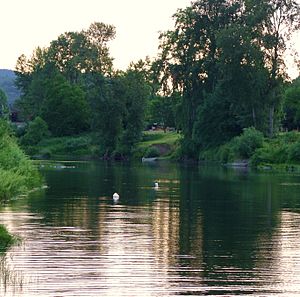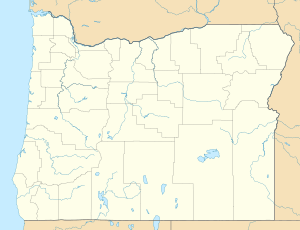South Umpqua River facts for kids
Quick facts for kids South Umpqua River |
|
|---|---|

The South Umpqua near its confluence with the North Umpqua
|
|
|
Location of the mouth of the South Umpqua River in Oregon
|
|
| Country | United States |
| State | Oregon |
| County | Douglas |
| Physical characteristics | |
| Main source | Confluence of forks near Fish Mountain Northwest of Crater Lake, Cascade Range 2,009 ft (612 m) 43°06′26″N 122°35′22″W / 43.10722°N 122.58944°W |
| River mouth | Confluence with North Umpqua River Near Roseburg 361 ft (110 m) 43°16′04″N 123°26′46″W / 43.26778°N 123.44611°W |
| Length | 115 mi (185 km) |
| Basin features | |
| Basin size | 1,800 sq mi (4,700 km2) |
The South Umpqua River is a river in southwestern Oregon, United States. It is about 115 miles (185 km) long. This river is a major branch of the Umpqua River. It flows from the Cascade Range mountains and joins the North Umpqua River near Roseburg.
The river starts in a quiet canyon. Then it flows into the more populated South Umpqua Valley. This valley is located east of Canyonville.
Contents
River's Journey
The South Umpqua River begins high in the Cascade Range. It starts north of Fish Mountain. Two small streams come together to form the river. This happens in eastern Douglas County. It is about 20 miles (32 km) northwest of Crater Lake.
The river flows southwest through a quiet canyon. This area is part of the Umpqua National Forest. It passes through small towns like Tiller, Milo, and Days Creek.
The river then enters the South Umpqua Valley near Canyonville. It flows under Interstate 5. The river then runs north alongside the highway. It passes by towns such as Tri-City, Myrtle Creek, and Roseburg. Finally, it meets the North Umpqua River from the south. Together, they form the main Umpqua River. This meeting point is about 6 miles (10 km) northwest of Roseburg.
Cow Creek: A Major Branch
One important stream that flows into the South Umpqua River is Cow Creek. Cow Creek also starts in the Cascade Mountains. It flows west, south of Canyonville. For much of its journey, Cow Creek flows next to the South Umpqua River. A mountain ridge separates the two waterways.
Cow Creek flows further west. Then it turns north and joins the South Umpqua River at Tri-City. Cow Creek carries a lot of water. It is almost as big as the South Umpqua River itself.
River History
For many centuries, the South Umpqua River and Cow Creek were home to the Umpqua people. These Native American tribes lived and thrived along the rivers.
In 1848, gold was found on the South Umpqua River. This discovery brought many gold miners to the area. Farmers also came, as the land was good for growing crops.
Treaty and Its Impact
In 1853, a treaty was made. Joel Palmer, a government official, met with Chief Quintioosan and other leaders. They represented the Cow Creek Band of the Umpqua Tribe. The United States government approved this treaty. However, the promises made in the treaty were never kept.
Important Trails
Starting in the 1820s, fur trappers and traders used the South Umpqua River valley. They used it as a path for what became known as the Siskiyou Trail. This trail was originally made from old Native American footpaths. It became a key route between the Pacific Northwest and California's Central Valley.
In 1846, people wanted a safer way for settlers to reach the Willamette Valley. So, Jesse and Lindsay Applegate, Levi Scott, and 13 others explored a new route. This route connected the southern Willamette Valley with Goose Lake in Northern California. It was named the Applegate Trail. It also connected to the northern part of the California Trail.
Today, Interstate 5 follows much of the original Siskiyou Trail route through the valley.
Economic Importance
In the 1900s, the South Umpqua River valley became important for producing timber. Timber means wood from trees. In the 2000s, tourism became a big part of the valley's economy.
Cow Creek Band's Progress
The Cow Creek Band of the Umpqua Tribe of Indians received a land claims settlement in 1988. This was money given by the U.S. federal government.
Using this money, which was $1.5 million, the Cow Creek Band started new businesses. They now operate a casino, a hotel, and a convention center. These businesses are located in Canyonville, along the South Umpqua River.
South Umpqua Falls
South Umpqua Falls is a popular spot near Tiller. It has a picnic area and a United States Forest Service campground. The campground is open from May 1 to October 31. It has 16 spots for tents or trailers.
 | Dorothy Vaughan |
 | Charles Henry Turner |
 | Hildrus Poindexter |
 | Henry Cecil McBay |


